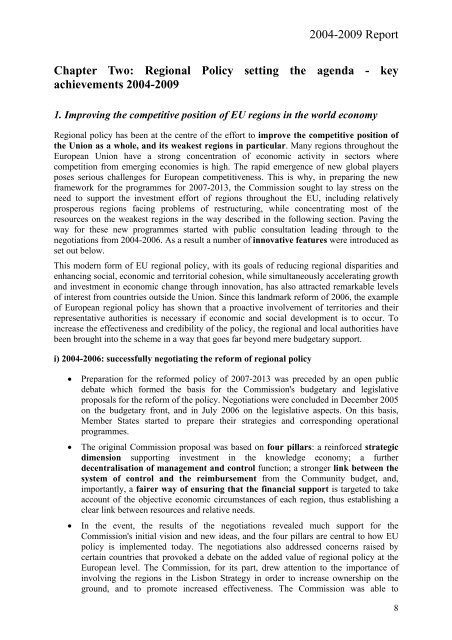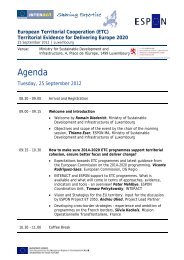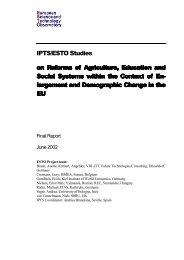Achievements of Europe's regional policy 2004-2009 - Et2050.eu
Achievements of Europe's regional policy 2004-2009 - Et2050.eu
Achievements of Europe's regional policy 2004-2009 - Et2050.eu
You also want an ePaper? Increase the reach of your titles
YUMPU automatically turns print PDFs into web optimized ePapers that Google loves.
<strong>2004</strong>-<strong>2009</strong> Report<br />
Chapter Two: Regional Policy setting the agenda - key<br />
achievements <strong>2004</strong>-<strong>2009</strong><br />
1. Improving the competitive position <strong>of</strong> EU regions in the world economy<br />
Regional <strong>policy</strong> has been at the centre <strong>of</strong> the effort to improve the competitive position <strong>of</strong><br />
the Union as a whole, and its weakest regions in particular. Many regions throughout the<br />
European Union have a strong concentration <strong>of</strong> economic activity in sectors where<br />
competition from emerging economies is high. The rapid emergence <strong>of</strong> new global players<br />
poses serious challenges for European competitiveness. This is why, in preparing the new<br />
framework for the programmes for 2007-2013, the Commission sought to lay stress on the<br />
need to support the investment effort <strong>of</strong> regions throughout the EU, including relatively<br />
prosperous regions facing problems <strong>of</strong> restructuring, while concentrating most <strong>of</strong> the<br />
resources on the weakest regions in the way described in the following section. Paving the<br />
way for these new programmes started with public consultation leading through to the<br />
negotiations from <strong>2004</strong>-2006. As a result a number <strong>of</strong> innovative features were introduced as<br />
set out below.<br />
This modern form <strong>of</strong> EU <strong>regional</strong> <strong>policy</strong>, with its goals <strong>of</strong> reducing <strong>regional</strong> disparities and<br />
enhancing social, economic and territorial cohesion, while simultaneously accelerating growth<br />
and investment in economic change through innovation, has also attracted remarkable levels<br />
<strong>of</strong> interest from countries outside the Union. Since this landmark reform <strong>of</strong> 2006, the example<br />
<strong>of</strong> European <strong>regional</strong> <strong>policy</strong> has shown that a proactive involvement <strong>of</strong> territories and their<br />
representative authorities is necessary if economic and social development is to occur. To<br />
increase the effectiveness and credibility <strong>of</strong> the <strong>policy</strong>, the <strong>regional</strong> and local authorities have<br />
been brought into the scheme in a way that goes far beyond mere budgetary support.<br />
i) <strong>2004</strong>-2006: successfully negotiating the reform <strong>of</strong> <strong>regional</strong> <strong>policy</strong><br />
• Preparation for the reformed <strong>policy</strong> <strong>of</strong> 2007-2013 was preceded by an open public<br />
debate which formed the basis for the Commission's budgetary and legislative<br />
proposals for the reform <strong>of</strong> the <strong>policy</strong>. Negotiations were concluded in December 2005<br />
on the budgetary front, and in July 2006 on the legislative aspects. On this basis,<br />
Member States started to prepare their strategies and corresponding operational<br />
programmes.<br />
• The original Commission proposal was based on four pillars: a reinforced strategic<br />
dimension supporting investment in the knowledge economy; a further<br />
decentralisation <strong>of</strong> management and control function; a stronger link between the<br />
system <strong>of</strong> control and the reimbursement from the Community budget, and,<br />
importantly, a fairer way <strong>of</strong> ensuring that the financial support is targeted to take<br />
account <strong>of</strong> the objective economic circumstances <strong>of</strong> each region, thus establishing a<br />
clear link between resources and relative needs.<br />
• In the event, the results <strong>of</strong> the negotiations revealed much support for the<br />
Commission's initial vision and new ideas, and the four pillars are central to how EU<br />
<strong>policy</strong> is implemented today. The negotiations also addressed concerns raised by<br />
certain countries that provoked a debate on the added value <strong>of</strong> <strong>regional</strong> <strong>policy</strong> at the<br />
European level. The Commission, for its part, drew attention to the importance <strong>of</strong><br />
involving the regions in the Lisbon Strategy in order to increase ownership on the<br />
ground, and to promote increased effectiveness. The Commission was able to<br />
8







